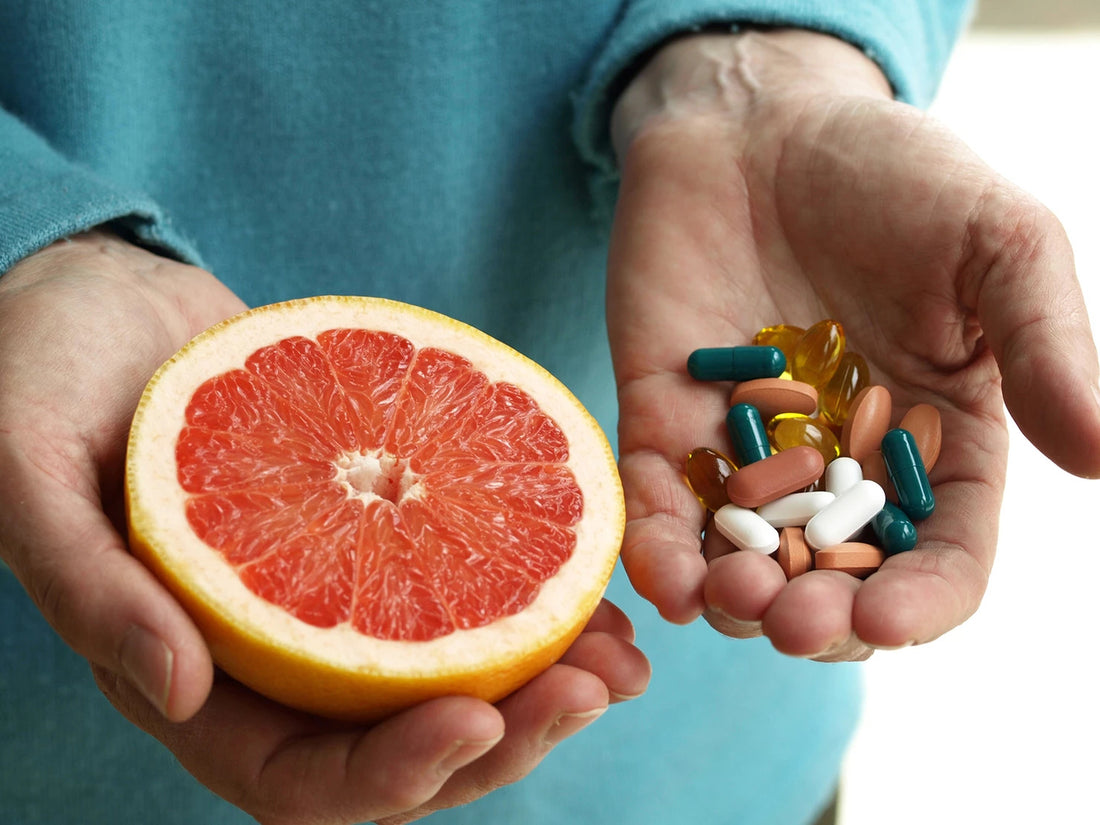
Surgery Prep and Recovery Nutrition: Grapefruit need to knows
At HealFast, we like to focus on what you need to know to stay healthy and how to recover quickly when faced with surgeries, illness, injury, and accidents.
Most people give little thought to how to prep for an upcoming surgery or how best to recover, and even fewer (as would be expected) for unanticipated injury. But it is interesting to note that most people at some point in their life will, in fact, encounter this situation.
Research shows that the combined annual US in-patient1 and out-patient2 procedures, has risen to nearly 100 million. So just in case, it might happen to you, we are here for you!
In today’s post, we are going to talk about grapefruit in response to one follower’s request. There is a lot of information out there on grapefruit’s pros and cons, some of which should make people wary of when and why they choose to consume it.

Grapefruit is a semi-sweet, semi-bitter subtropical citrus fruit that was consumed at nearly 25 lbs per capita in the American diet during the mid/late 1900's.
While consumption of grapefruit is down among the general population, it is still wildly touted for its weight loss properties (in reality: it’s more of how you use it in a diet rather than special enzymes that aid any weight loss).
Whether a consumer is attempting to obtain needed vitamins and nutrients for energy, healing, and recovery, or just adding a kick to your brunch cocktails; grapefruit has some need-to-knows, particularly when it comes to surgery, surgery recovery and nutrition, and interactions with certain medications taken in the surgical period.
Let’s start with the positives!
Grapefruit is an excellent source of nutrients, including vitamin C, pectin, and the antioxidant lycopene. It has antimicrobial properties (i.e. kills and/or slows the growth of microorganisms), high amounts of antioxidants and lycopene (which are key in reducing free-radicals after surgery, injury, or exercise strain), and can even lower cholesterol naturally and is further reinforced by its high fiber content, (see our article on Fiber and Cholesterol)!
Grapefruit is great if you like tangy and partial sour things! And its lower sugar content compared to other fruits make it a favorite among nutritionists focusing on weight loss. That said, there are some big factors to consider when adding it to your diet and these can become especially important when trying to leverage its healing benefits in and around the surgery period. So let’s talk about risks and what you need to know, starting with the most important: negative effects caused by harmful drug interactions.
Interactions with Anesthesia and Medications
Most surgical procedures use a general or local anesthetic administered by a trained anesthesiologist. In these cases, the liver will be taking on the brunt of the drug processing. Thus, it is best before surgery to give the liver a break, so avoid heavy alcohol consumption and saturated fats, and get plenty of water.
In addition, there are some substances and medications3 (including anesthesia) that can have some severe interactions with certain enzymes in grapefruit. At a high level, Grapefruit and its juices inhibit a chemical in the intestine and liver needed to break down many drugs in the body. Furanocoumarin, as they are called, can irreversibly inhibit a metabolizing enzyme cytochrome P450 3A4 (CYP3A4), which is a metabolizing enzyme for almost 50% of drugs, and is found in the liver and small intestinal epithelial cells.
The tampering or absence of this chemical (by citrus juices) can lead to higher concentrations, making the drug more potent. Thus, a time-release capsule might dump more of the drug in the system quicker in the presence of grapefruit enzymes, or in surgery increase a drug’s intensity, or even use up the drug faster than the surgery would have desired to leave a patient vulnerable. There are many potential outcomes.
Grapefruits speed up the metabolization of certain substances
While the interactions may vary, in general, the enzymes in grapefruit speed up the metabolism and presence of the drug throughout the body, which can also result in stomach bleeding or kidney damage. Some popular substances affected by these enzymes include Caffeine, Dexedrine, Adderall, Ritalin, Concerta, Zoloft, Lustral, Doral, Lipitor, Crestor, Zocor, and even Viagra and Cialis, to name a few.
It is also important to note that grapefruit contains a powerful bio-flavanoid called Quercetin. It has been extensively studied and is often taken with Bromelain to aid in surgery and injury recovery by fighting unwanted inflammation. For example, the HealFast Surgical and Injury Recovery Formula does contain both Quercetin and Bromelain, but only in the Post-Op formula to ensure there is zero interaction with anesthesia or other medications used. Your safety is our primary concern but the benefits of this nutrient found in grapefruit are too important to exclude in an all-encompassing formula.
In Summary
Grapefruits are great! They are solid fiber, help limit appetite, and can be a less sugary alternative to other fruits like oranges and grapes. That said if you are taking certain medications be careful and consult with your physician to determine what interactions or complications might occur when eating concurrently with grapefruit.
If you would like more information on surgery preparation and recovery nutrition, see our broader post on “Surgery and Injury Recovery: Nutrition for a Strong Recovery”
Citations:
-
https://www.hcup-us.ahrq.gov/reports/statbriefs/sb223-Ambulatory-Inpatient-Surgeries-2014.jsp
-
https://en.wikipedia.org/wiki/Grapefruit%E2%80%93drug_interactions#Affected_drugs
Disclaimer: All information here is for educational purposes only and is not meant to cure, heal, diagnose nor treat. This information must not be used as a replacement for medical advice, nor can the writer take any responsibility for anyone using the information instead of consulting a healthcare professional. All serious disease needs a physician.













